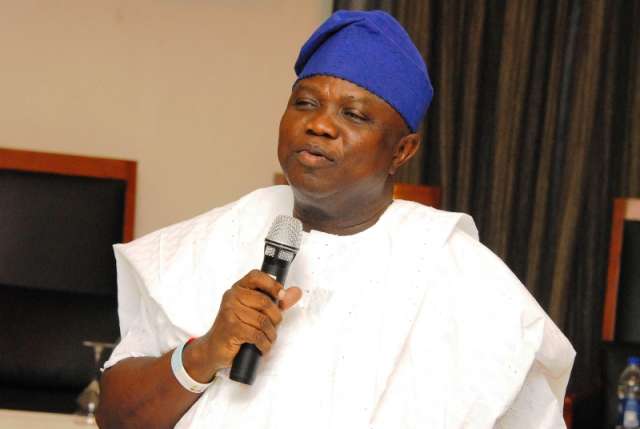- Ambode Proposes Special Fund to Bridge N4.47tn Infrastructure Gap
Confronted with an acute dearth of funds to finance the state’s capital expenditure, Lagos State Governor, Mr. Akinwunmi Ambode, Tuesday proposed the establishment of a special fund which would be deployed to address the state’s infrastructure deficit.
Ambode also justified the decision of the state government to increase land use charge between 200 and 500 per cent, which he said, was born of the need to drive capitalism in the state with a sense of social inclusion and generate more funds to bridge infrastructure gap.
He canvassed these positions at an interactive session he held with organised private sector (OPS) and captains of industry at the Eko Hotels & Suites, Victoria Island yesterday, noting that the meeting “is more about the future of Nigeria than the future of Lagos.”
The session, which was tagged Lagos Means Business, was attended by President of Dangote Group, Alhaji Aliko Dangote, Founder of FCMB Plc, Otunba Subomi Balogun, Chairman of Heirs Holdings, Mr. Tony Elumelu, Founder of Premier Lotto Limited, Sir Kessington Adebutu, Chairman of Zenith Bank Plc Mr. Jim Ovia and Chairman of Honeywell Group Oba Otudeko, among others.
At the session, Ambode disclosed that the state would require a whopping sum of $50 billion (equivalent to N14.47 trillion) in the next five years to bridge infrastructure gap with the exclusion of education, health and housing sectors.
He noted that about $20 billion would be required for the construction of road construction alone and $16.5 billion for providing 24-hour stable power supply under the Lagos State Power Reforms Law, 2018.
He further disclosed that the state would require $9.3 billion for transportation; $5 billion for information & communication technology; $3 billion for water development and $2.7 billion for waste management and other environmental challenges over the period of five years.
At these instances, Ambode proposed that an infrastructure fund be established “to address the state’s huge infrastructure deficit. There is need for infrastructure fund. This fund will be managed by private sector. It will be similar to the Lagos State Security Trust Fund.”
Specifically, the governor defended the decision of the state government to increase land use charge, which according to him, became necessary because his administration planned to do more than what it had been doing in the last three years with the budget of N1.046 trillion.
Under the 2018 budget, the governor said the state proposed to generate N720 billion internally, noting that the fund would either come from taxes or we turn to multilateral financial agencies to borrow.
He said: “If we must do not tax, we must go to multilateral financial agencies. If we do not tax now, we will be forced to borrow from multilateral financial agencies. At the end of the day, we are still going to use tax payers’ monies to fund the actual loans and the interests.”
He provided insight into the Land Use Charge Law, noting that the law “was enacted in 2002. The law makes provision for review every five years. But it has not been reviewed for 15 years. I do not think we have done anything bad to review the law at this time because the value of property in all part is more than double.
He, however, said the state government “is ready to dialogue with the Organised Private Sector on the land use charge. We are a state of 24 million people. Only eight million are taxable. The number of people that actually submitted tax returns in 2017 is two million. From this number, only 700,000 people paid their taxes.”
Apparently, Ambode noted that the current tax returns were not enough to cater for the capital projects ongoing across the state, adding that major cities across the world with thriving economies are sustained by the taxes paid by residents.
Also at the meeting, Dangote said he was initially displeased with the decision of the state government to increase land use charge, noting that he had to confront the governor about it at a public function last Saturday.
He, however, said a business associate later explained details about the land use charge to him, which according to him, was not high in the real sense.
He urged the business community to help the Lagos State government and voluntarily pay their taxes, adding that Lagos is friendly.
In his remark, Ovia said corporate bodies “now feel safe to invest in the state due to the investment in security.”
He therefore, commended the state government for sustaining the Lagos State Security Trust Fund (LSSTF).
According to him, Ambode has spoken today like a Chairman/CEO of a company to his shareholders. We are definitely one of your shareholders and we would renew your mandate in 2019 there’s no doubt.


 Naira4 weeks ago
Naira4 weeks ago
 Naira3 weeks ago
Naira3 weeks ago


 Naira4 weeks ago
Naira4 weeks ago




 Naira3 weeks ago
Naira3 weeks ago
 Commodities4 weeks ago
Commodities4 weeks ago


 Sport Business4 weeks ago
Sport Business4 weeks ago


 News3 weeks ago
News3 weeks ago


 Banking Sector4 weeks ago
Banking Sector4 weeks ago























